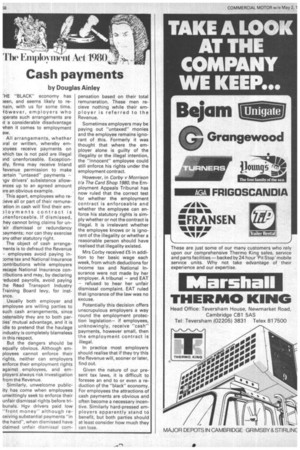Cash payments
Page 68

If you've noticed an error in this article please click here to report it so we can fix it.
by Douglas Ainley
HE "BLACK" economy has )een, and seems likely to renain, with us for some time, ibwever, employers who )perate such arrangements are it a considerable disadvantage vhen it comes to employment aw.
All arrangements, whether )ral or written, whereby em)oyees receive payments on vhich tax is not paid are illegal ind unenforceable. ExceptionIlly, firms may receive Inland levenue permission to make ;ertain "untaxed" payments -igv drivers' subsistence allowinces up to an agreed amount 3 re an obvious example.
This apart, employees who re;ieve all or part of their remune.ation in cash will find their em)1 oy m ents contract is Jnenforceable. If dismissed, hey cannot bring claims for un'air dismissal or redundancy )ayments; nor can they exercise 3 ny other statutory right.
The object of cash arrange-nents is to defraud the Revenue employees avoid paying in.-;ome tax and National Insurance 3ontributions while employers escape National Insurance con:ributions and may, by declaring -educed payrolls, avoid paying he Road Transport Industry Training Board levy, for instence.
Usually both employer and employee are willing parties to such cash arrangements, since ostensibly they are to both parties' mutual advantage, and it is idle to pretend that the haulage industry is completely blameless in this respect.
But the dangers should be equally obvious. Although em ployees cannot enforce their rights, neither can employers enforce their employment rights against employees, and employers always risk investigation from the Revenue.
Similarly, unwelcome publicity has come when employees unwittingly seek to enforce their unfair dismissal rights before tribunals. Hgv drivers paid low "front money" although receiving substantial payments "in the hand", when dismissed have claimed unfair dismissal corn pensation based on their total remuneration. These men recieve nothing while their employer is referred to the Revenue.
Sometimes employers may be paying out "untaxed" monies and the employee remains ignorant of this. Formerly it was thought that where the employer alone is guilty of the illegality or the illegal intention, the "innocent" employee could still enforce his rights under the employment contract.
However, in Corby v Morrison t/a The Card Shop 1980, the Employment Appeals Tribunal has now ruled that the correct test for whether the employment contract is enforceable and whether the employee can enforce his statutory rights is simply whether or not the contract is illegal. It is irrelevant whether the employee knows or is ignorant of the illegality or whether a reasonable person should have realised that illegality existed.
Mrs Corby received £5 in addition to her basic wage each week, from which deductions for income tax and National Insurance were not made by her employer. A tribunal and EAT refused to hear her unfair dismissal complaint. EAT ruled that ignorance of the law was no excuse.
Potentially this decision offers unscrupulous employers a way round the employment protection legislationif employees, unknowingly, receive "cash" payments, however small, then the employment contract is illegal.
In practice most employers should realise that if they try this the Revenue will, sooner or later, find out.
Given the nature of our present tax laws, it is difficult to foresee an end to or even a reduction of the "black" economy. For employees the attractions of cash payments are obvious and often become a necessary incentive. Similarly hard-pressed employers apparently stand to benefit, but both parties should at least consider how much they can lose.
















































































































